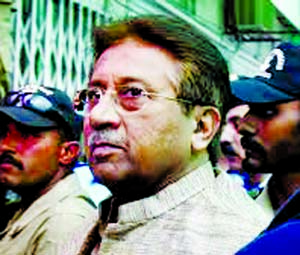
Dawn.com :
A special court in Islamabad on Tuesday found former military ruler retired Gen Pervez Musharraf guilty of high treason and handed him the death sentence under Article 6 of the Constitution.
This is the first time in Pakistan’s history that a military chief has been declared guilty of high treason and handed the death sentence. The verdict was split 2-1.
Article 6 of the Constitution says: “Any person who abrogates or subverts or suspends or hold in abeyance, or attempts or conspires to abrogate or subvert or suspend or hold in abeyance the Constitution by use of force or show force or by any other unconstitutional means shall be guilty of high treason.”
The punishment for high treason is death or lifetime imprisonment, according to the High Treason (Punishment) Act, 1973. The three-member bench of the special court – headed by Peshawar High Court Chief Justice Waqar Ahmad Seth and comprising Justice Nazar Akbar of the Sindh High Court (SHC) and Justice Shahid Karim of the LHC – announced the verdict in the long-drawn high treason case against Musharraf after hearing final arguments today. A detailed verdict will be issued in 48 hours.
The former military chief is currently in Dubai in the United Arab Emirates. He was admitted to a hospital following deterioration of his health earlier this month. In a video statement from his hospital bed, he called the treason case “absolutely baseless”. “I have served my country for 10 years. I have fought for my country. This [treason] is the case in which I have not been heard and I have been victimised,” he had stated.
His team can appeal today’s verdict in the Supreme Court. If the top court upholds the special court’s verdict, the president possesses the constitutional authority under Article 45 to pardon a death row defendant.
The high treason trial of the former military dictator for imposing the state of emergency on Nov 3, 2007, had been pending since December 2013. Musharraf came to power after ousting then-Prime Minister Nawaz Sharif in a 1999 bloodless coup. In an infamous purge in 2007, Musharraf imposed a state of emergency and placed several key judges under house arrest in Islamabad and elsewhere in Pakistan.
He was booked in the treason case in December 2013, when the PML-N government under Nawaz returned to power. Musharraf was indicted on March 31, 2014, and the prosecution had tabled the entire evidence before the special court in September the same year. However, due to litigation at appellate forums, the trial of the former military dictator lingered on and he left Pakistan in March 2016 to seek medical treatment, promising to come back to his “beloved homeland” in a few weeks.
The special court was reformed six times during the course of the case.
The verdict announced by the special court today was the one it had reserved on November 19.
The special court at that time had said it would announce the verdict on Nov 28 on the basis of available record. However, days before the final verdict was to be announced, the Pakistan Tehreek-i-Insaf (PTI) government sought deferment of the announcement of the verdict and in a fresh petition, requested the Islamabad High Court that “the special court be restrained from passing final judgement in the trial”.
Subsequently, on November 27, the IHC stopped the special court from issuing its verdict reserved in the case on November 19. Additionally, they directed the government to notify a prosecution team by December 5.
On December 5, the new prosecution team for the government appeared before the special court after which the special court adjourned proceedings till December 17, adding that it would hear arguments and announce the verdict on the same day. At the outset of today’s hearing, the government’s prosecutor, Advocate Ali Zia Bajwa, said that they had submitted three petitions today.
One of the petitions asked that the court make three individuals – former prime minister Shaukat Aziz, former Supreme Court chief justice Abdul Hameed Dogar and former law minister Zahid Hamid – suspects in the case. “We want to make Musharraf’s facilitators and companions suspects as well. It it important that the trial of all suspects is held at the same time,” the prosecutor said.
“Submitting such a request after three and a half years means the government doesn’t have the right intentions. Today the case was set for final arguments and now new petitions have been submitted,” remarked Justice Karim. Justice Akbar questioned the lawyer regarding the evidence against the individuals that the government wanted to include in the case. “The stage of investigations and [presenting] evidence has passed. Has there been a new investigation against the included suspects?” he asked, in response to which the prosecutor said that an investigation can only be carried out after the complaint is registered.
The prosecutor said that according to a 2014 petition, Shaukat Aziz had told Musharraf to impose emergency.
Justice Akbar remarked that the prosecutor was referring to Musharraf’s petition in which the verdict has been reserved while Justice Karim added that the Supreme Court has also issued a verdict on a petition regarding other suspects. Justice Akbar said two weeks had been earlier granted to the government to present a modified charge sheet. “As per the law, charged can be amended anytime before the verdict,” responded the prosecutor.

